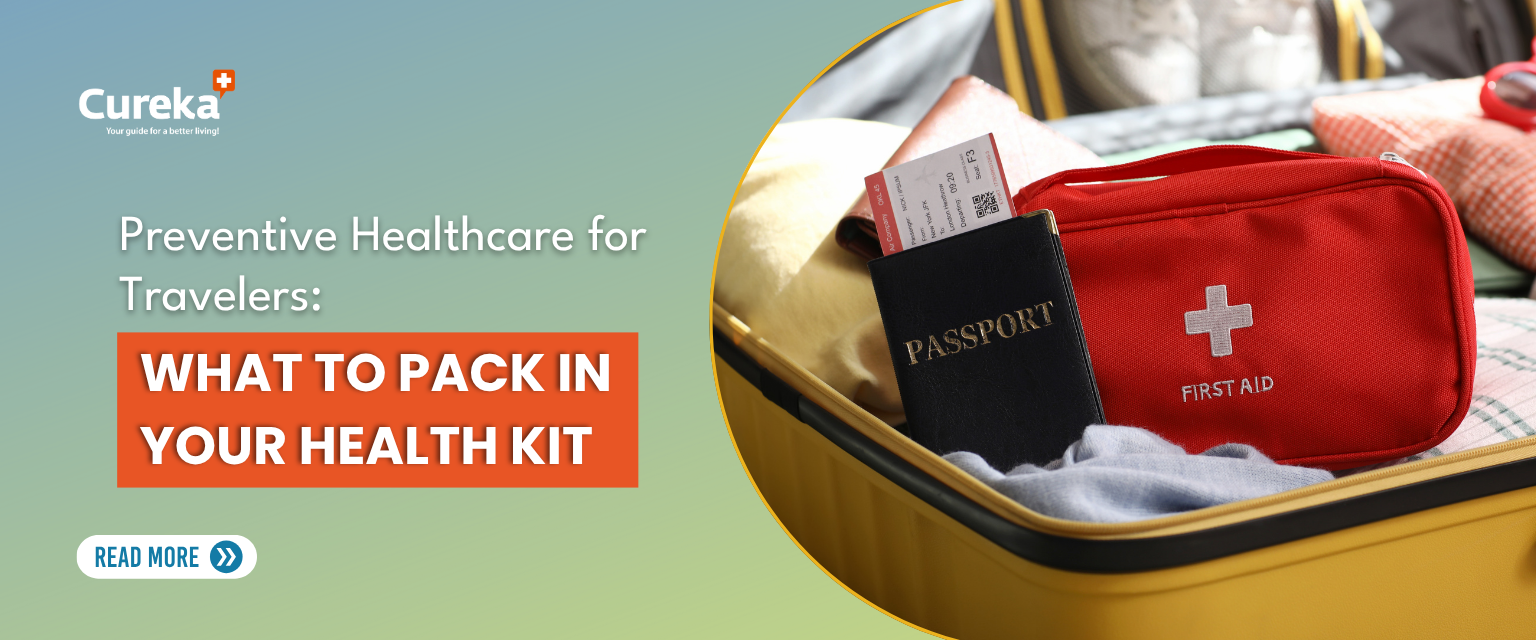Preventive Healthcare for Travelers: What to Pack in Your Health Kit
Medically Reviewed By:
Dr. Hema Sathish M.B.B.S., D.D(UK)
Dermatologist, Founder of Cureka
Traveling—whether for leisure, business, or adventure—brings excitement and new experiences. But along with the joy of discovering new places, travelers are often exposed to unfamiliar climates, foods, and health risks. Nothing disrupts a trip faster than unexpected illness. This is where preventive healthcare and a well-packed travel health kit play a vital role.
A thoughtfully prepared kit doesn’t just handle emergencies; it prevents minor issues from turning into major setbacks. Let’s go through the essentials you should pack in your health kit to stay safe, comfortable, and prepared while on the move.
Why Preventive Healthcare Matters When Traveling
Before jumping into the packing list, it’s important to understand the role of preventive healthcare in travel:
- Exposure to new pathogens: Different regions have unique bacteria, viruses, and parasites that your body may not be immune to.
- Climate challenges: Shifts in temperature, humidity, and altitude can strain the body.
- Food and water safety: Travelers often face digestive issues due to contaminated or unfamiliar foods.
- Limited access to healthcare: Depending on your destination, medical care may be limited or expensive.
A preventive mindset ensures you’re not just reacting to illness but actively minimizing the risk of falling sick.
The Core Essentials of a Travel Health Kit
Think of your kit as a personalized first-aid box—compact, lightweight, but comprehensive enough to cover the most common health challenges. Here’s what to include:
1. Prescription Medications
Always carry enough of your prescribed medicines for the entire trip plus extra in case of delays. Store them in their original labeled bottles to avoid customs issues. Examples:
- Blood pressure medication
- Diabetes medication or insulin
- Thyroid tablets
- Asthma inhalers
Tip: Carry a copy of your prescription and doctor’s note, especially if you’re carrying injectable medications or controlled substances.
2. Over-the-Counter (OTC) Medicines
OTC medicines can quickly relieve minor but disruptive health issues:
- Pain relievers (paracetamol, ibuprofen)
- Antihistamines for allergies and insect bites
- Motion sickness tablets if you’re prone to travel-related nausea
- Antacids or digestive enzymes for indigestion
- Oral rehydration salts (ORS) to manage dehydration from diarrhea or heat
- Cough lozenges for throat irritation
Cuts, blisters, or scrapes can happen anytime. Pack:
- Band-aids in assorted sizes
- Sterile gauze and medical tape
- Antiseptic wipes or liquid
- Tweezers (for splinters or ticks)
- Small scissors
- Cold compress packs (instant ones for swelling or sprains)
4. Preventive Healthcare Items
These essentials help you avoid falling ill in the first place:
- Hand sanitizer and disinfectant wipes (for surfaces in airplanes or hotels)
- Mosquito repellents (lotion, spray, or patches) to prevent malaria, dengue, or Zika
- Sunscreen (broad-spectrum, SPF 30+) to prevent sunburn and skin damage
- Face masks for crowded places or polluted areas
- Reusable water bottle with filter (especially important in regions with unsafe tap water)
5. Supplements and Immunity Boosters
Travel can weaken your immune system due to irregular sleep, food changes, and stress. Pack supplements such as:
- Vitamin C and Zinc for immunity
- Probiotics to maintain gut health and prevent traveler’s diarrhea
- Melatonin or herbal sleep aids for adjusting to new time zones
- Electrolyte tablets for hydration during long hikes or hot weather
6. Personal Care and Hygiene
Maintaining hygiene is half the battle in preventive health:
- Antibacterial soap or travel-size body wash
- Menstrual hygiene products (tampons, sanitary pads, or menstrual cup)
- Intimate hygiene wash (especially for longer trips in hot or humid regions)
- Lip balm with SPF
- Moisturizing cream to prevent dry skin from air travel
- Nail cutter (prevents infections from broken nails)
7. Specialized Items Based on Destination
Your destination will influence what additional items you need:
- Tropical regions: Malaria prophylaxis (consult your doctor), extra mosquito nets, stronger insect repellent.
- Cold climates: Thermometer, cold/flu medication, heat packs, heavy moisturizers.
- High altitude travel: Altitude sickness tablets, oxygen cans (if prescribed).
- Adventure trips: Bandages, antiseptic spray, waterproof first-aid pouch, blister patches.
Pre-Travel Preventive Steps
Packing the right health kit is important, but pre-travel planning is just as essential. Here’s a checklist before you board:
- Vaccinations and Health Checkups
- Research required or recommended vaccines (yellow fever, typhoid, hepatitis, etc.).
- Visit your doctor at least 4–6 weeks before travel.
- Travel Insurance with Health Coverage
- Choose a plan that covers emergency evacuation, hospitalization, and chronic conditions.
Digital Health Copies
Save electronic copies of prescriptions, vaccination certificates, and insurance in your phone and cloud storage.
Dietary Planning
- If you have food allergies, learn key phrases in the local language to communicate them.
- Carry allergy cards if needed.
Organizing Your Travel Health Kit
It’s not just what you pack, but how you organize it:
- Use a waterproof, zippered pouch to prevent moisture damage.
- Label compartments: medications, first aid, hygiene, supplements.
- Keep daily medications in a pill organizer for convenience.
- Carry the kit in your carry-on luggage, not checked baggage, in case of flight delays or lost bags.
Why You Should Pack a Travel Health Kit
A well-stocked travel health kit isn’t just a convenience—it’s a preventive measure rooted in evidence. Research indicates that travelers face significantly heightened risks of gastrointestinal issues, respiratory illnesses, skin problems, and minor injuries during trips abroad. One review notes that gastrointestinal and respiratory problems are among the most common ailments affecting returning international travelers, and that minor wounds and skin conditions also frequently arise (1). Another study surveying travelers to developing countries found that the most commonly used items were analgesics, antidiarrheals, and antiseptics—illuminating the practical need for these basics when medications may be hard to source or of uncertain quality overseas (2).By providing immediate relief, a travel health kit helps avoid unnecessary medical visits, prevents complications, and ensures you remain in control—so your trip doesn’t get sidelined by health setbacks.
Preventive Travel Habits Beyond the Health Kit
While your kit is the first line of defense, your daily travel habits matter just as much:
- Stay hydrated with safe drinking water.
- Eat wisely—avoid raw or undercooked street food if hygiene looks questionable.
- Wash hands regularly, especially before eating.
- Stick to your medication schedule even while on the move.
- Rest adequately—fatigue lowers immunity.
Sample Packing List at a Glance
Here’s a quick reference:
✅ Prescription medicines + doctor’s note
✅ Pain relievers, antacids, antihistamines
✅ Oral rehydration salts (ORS)
✅ First-aid kit: band-aids, gauze, antiseptic
✅ Hand sanitizer + disinfectant wipes
✅ Mosquito repellent + sunscreen
✅ Vitamin C, probiotics, zinc
✅ Menstrual and personal hygiene items
✅ Thermometer + face masks
✅ Water bottle with filter
Conclusion
A smart traveler is a prepared traveler. Packing a health kit is not about being paranoid—it’s about being practical. Preventive healthcare ensures that small health issues don’t escalate into trip-ending emergencies. By carrying prescription medicines, first-aid supplies, preventive items, and immunity boosters, you give yourself the gift of safe, worry-free travel.
So, the next time you plan a trip—whether it’s a weekend getaway or a month-long adventure abroad—remember: your travel health kit is as essential as your passport. Pack wisely, stay healthy, and make every journey memorable for the right reasons.
References:
- Travel Medical Kit – 2016 Mar – https://pubmed.ncbi.nlm.nih.gov/26900112/
- Medical supplies for travelers to developing countries – 2004 Jul – https://pubmed.ncbi.nlm.nih.gov/15541222/











